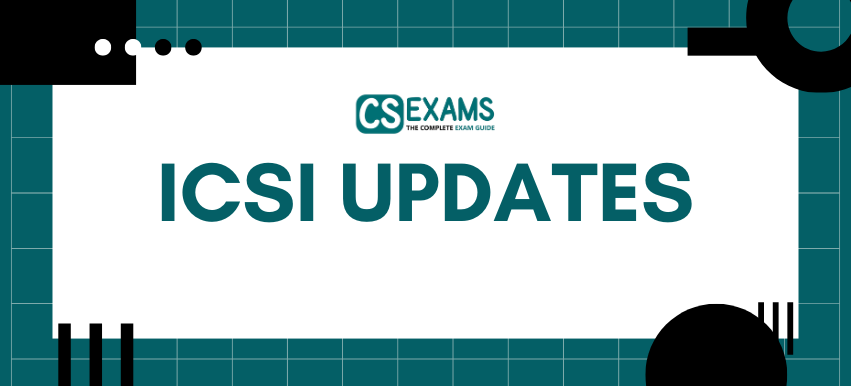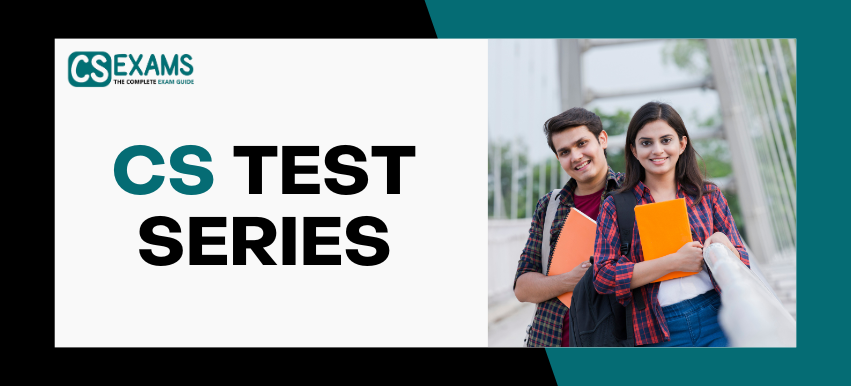Preparation for the CS professional exam can be heavy for many students, especially when you are uncertain which chapters carry over weight. With a session in June 2026, it is important to focus on subjects that provide the greatest return at the time of your study.
In this article, we break down the official chapter on the weight for each subject, which helps you prepare a smart modification plan with the latest data from ICSI and reliable exam pattern guides. The new course of ICSI, introduced in 2022, continues to apply for the June 2026 examination cycle.
It has nine papers divided into three modules, each of which has 100 points. Know how marks are distributed in some parts of each paper to focus your efforts where it matters most.
ICSI CS Professional Exam Structure June 2026
This section explains the format and mark distribution for June 2026 based on official ICSI updates and official sources:
Each paper has 100 digits and lasts for 3 hours. There are no negative marks for wrong answers. To pass, candidates have to score at least 40% in each paper and 50% in a module.
| Module | Papers Included | Marks Per Paper | Total Module Marks |
| 1. | Paper 1, 2, 3 | 100 Each | 300 |
| 2. | Paper 4, 5, 6 | 100 Each | 300 |
| 3. | Paper 7, 8, Elective Paper 9 | 100 Each | 300 |
Module 1 Paper-wise Breakdown Details
Paper 1: Governance, Risk Management, Compliance, and Ethics
This includes governance (50), risk management (20), compliance (20), ethics and sustainability (10)
ICSI This paper tests your understanding of corporate governance principles and moral outlines. The subjects of governance and morality are now prominently including ESG ideas.
Key Part:
- Governance - 50 digits
- Risk Management - 20
- Compliance - 20
- Ethics and Stability - 10
Paper 2: Advanced Tax Law
- Part A: Indirect Taxes and GST (70 digits)
- Part B: Direct and International Taxation (30 digits)
The emphasis on GST and customs is clear, with direct tax accounting for the rest.
Paper 3: Drafting, Petitions, and Shifting Covering a single section, drafting techniques, legal petitions, and court processes, carrying 100 points. This paper demands strong legal writing and procedural knowledge.
Module 2 Weightage Breakdown
Paper 4: Secretarial Audit, Compliance Management & Due Diligence
- Compliance Management – 40 marks
- Secretarial Audit & Due Diligence – 60 marks
Focus shifts from paper 1’s policy to practical audit skills and due diligence processes.
Paper 5: Corporate Restructuring, Insolvency, Liquidation & Winding‑up
- Restructuring – 50 marks
- Insolvency & Liquidation – 50 marks.
Merger‑acquisition strategies and implementation under the Insolvency & Bankruptcy Code are major scoring areas.
Paper 6: Resolution of Corporate Disputes, Non‑Compliances & Remedies
Single 100‑mark paper on dispute resolution, litigation, arbitration, and remedies.
Expect both statutory and case-law-based questions.
Module 3 Weightage Breakdown
Paper 7: Corporate Funding & Listings in Stock Exchanges
Topics include IPOs, SEBI regulations, private equity, and listing compliance frameworks.
Paper 8: Multidisciplinary Case Studies
Full marks (100), subjective case‑based questions testing cross‑module application. This paper requires analytical thinking, linking knowledge across modules.
Paper 9: Elective Subjects (Open Book Exam)
-
Candidates choose one elective: Banking & Insurance, GST & Tax Planning, IPR, Labor Law, Forensic Audit, Insolvency Law, Valuation & Business Modelling, CSR & Social Governance, or AI, Data Analytics & Cybersecurity.
This open‑book paper tests the application under real‑world conditions.
Preparation Strategy for the CS Professional Exam
Getting success in the CS professional examinations demands a solid preparation strategy. This guide provides brief yet effective suggestions to help you excel in these important examinations. Whether you are a student or a professional working on the title of company secretary, this CS professional preparation strategy will be your roadmap for success.
- Plan your amendment module: Start with module 1 (governance, tax, drafting), then finish with module 2 and module 3 (focusing on case study and elective).
- Allocate time based on mark density: 25-30% for taxing tax on GST subjects, 20% for study and reorganization, and 15-20% for formatting and money. Rest for module 3 voluntary case studies.
- Use previous papers for high-frequency subjects: ICSI's official question bank and previous exams help to identify recurring subjects—these completely.
- Elective paper strategy: Despite being open, booked, and prepared, merit preparations—your notes, case examples, and regulation summary—so you can answer confidently during the exam.
Why Choose CS Exam Test Series for CS Preparation
When it comes to preparing for the hard CS exams, choosing the right test series can make all the difference. csexams.in has emerged as a trusted and result-oriented platform for CSEET, Executive, and Professional-level aspirants. Here's why it should be your first choice:
- Trusted by Thousands of CS Aspirants: The CS Exam has built a strong reputation among CS students for its consistent quality and excellent student feedback.
- ICSI Pattern-Based Question Papers: All tests are strictly based on the latest ICSI exam pattern and syllabus, ensuring real exam-like practice.
- Timely Evaluation with Expert Feedback: Get your answers evaluated within 48–72 hours along with detailed feedback, a marking scheme, and improvement tips.
- Personalized Mentorship & Study Planner: Get personalized mentorship, performance tracking, and a daily study plan customized to your syllabus completion pace.








